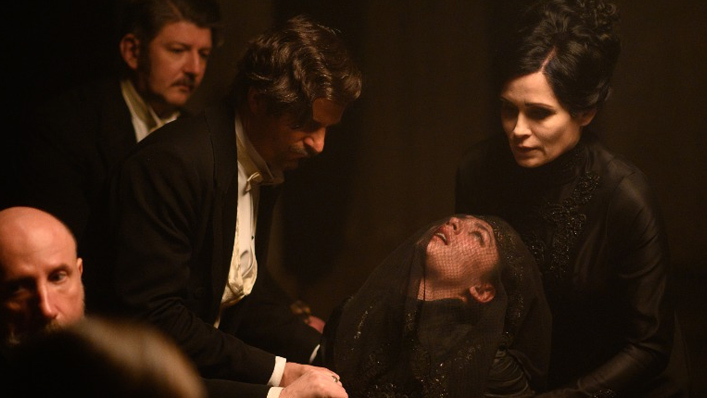Freud is a cokehead in Netflix’s preposterous drama about the famous psychologist

Sigmund Freud is a hypnotist, a cokehead and God knows what else in Netflix’s ridiculous new series. This show is atmospheric at times but resists embracing its silly premise, writes critic Luke Buckmaster.
If one word were to describe Sigmund Freud—the subject of Netflix’s, shall we say, historically unorthodox new series—that word is likely of course to be “psychologist” or “neurologist”. This is why we see the titular character (a stuffy and unlikeable Robert Finster) dangling a pendulum in the opening scene of the first episode, in front of an ageing lady, telling her to follow my gaze, follow my gaze, listen to my voice, listen to my voice, etcetera etcetera.
See also
* All new movies & series on Netflix
* All new streaming movies & series
Because every psychologist carries a p—hang on! Isn’t that a hypnotist? Is this show about the professor who came up with the Oedipus complex or some kind of flaky necromancer? A quick Google search informed me that Freud did indeed experiment with hypnotherapy before chucking away the pendulum—so OK, we’ll let that one slide.
The good doctor certainly seems intensely devoted to the job: getting this poor lady to relive a deeply traumatic scene from her past, involving her 7-year-old daughter being run over by a horse and carriage. But alas, this is a ruse. Cheeky Sigmund isn’t hypnotising her at all—she is his housekeeper Lenore (Brigitte Kern) and they are rehearsing a performance intended to trick his colleagues the following day into believing he is a brilliant hypnotist projecting himself into hitherto unexplored recesses of the mind.
Lenore isn’t happy about the arrangement. “I do everything for you,” she says, kvetching in the mode of an underappreciated mother about how she washes his clothes, tidies the house and cooks for him. “And now you’re asking me to do this!”
It is suddenly clear that the one word co-creators Marvin Kren, Stefan Brunner and Benjamin Hessler bestow upon their venerated subject isn’t neurologist, or psychiatrist, or even hypnotist, but a word very close to the spelling of his surname—with an “a” instead of an “e”. If this introductory sequence wasn’t historically, erm, unorthodox enough, Freud concludes the conversation by asking Lenore “perhaps you would also like some cocaine?”
Just so we’re clear: yes, the great Sigmund Freud is a cokehead. Again, after a quick Google search—well, we’ll let that one slide too.
Having now established that this series is indeed…unorthodox, it is nevertheless surprising to see the corpse of a mutilated sex worker slammed on the doctor’s desk by Inspectors Kiss (Georg Friedrich) and Poschacher (Christoph F Krutzler). So now Freud’s a…detective? Soon later Kren, the director of all eight episodes, depicts a seance where time stops and a Countess in a black veil (Anja Kling) enters a kind of supernatural hypnagogic state, walking towards an apparition-like woman in white while people around her remain frozen in the moment.
Like the establishing sequence with the pendulum, this seance is staged in such a way that we cannot see the walls in the room, or the furnishings, or any background details at all. There is only a thick, colourless black blanket behind the characters, as if they have been plucked from existence and placed in an empty dreamscape.
This concentrates the drama and creates an eerie effect, with nowhere to turn to other than the bodies and troubled faces of the actors. In this sense Freud evokes, however briefly, the great and highly influential 1928 film The Passion of Joan of Arc, which also ratchets up atmosphere by contrasting human detail with canvases comprising harrowing nothingness, thrusting viewers into a sort of empty chamber: the lonely recesses of the soul.

Now that I’ve name-dropped a pioneering classic I feel a little dirty—because while Freud is many things “great” certainly isn’t one of them. By the end of the first three episodes, which form the extent of this review (and no more shall I watch) the show still hasn’t established a single compelling ongoing narrative. Instead it wanders in various directions, including a subplot about one of the police inspectors, who has a traumatic past and participates in the old ‘pistols at dawn’ caper.
The series gets progressively more ridiculous, but always in a heavy-handed way—refusing to lean into its silliness and have fun with it. Kren abandons the initial idea that Freud is a charlatan hypnotist to go the complete other direction, bestowing upon him magical powers. In the third episode Freud simply puts his hand on a person’s forehead and POW: they are in an instant trance, thrust into the hallways of their tormented psyche.
These hallways lead the character in question to, of all things, the sight of a blood-smeared adult man, with an umbilical cord still attached to his body, singing opera very loudly. Why, you might ask? That is up to the good doctor to figure out. He’s a supernatural detective, you see. And a neurologist. And a psychoanalyst. And a hypnotist. And a fraud.

















